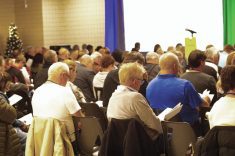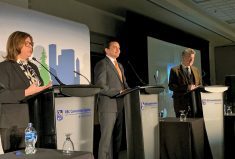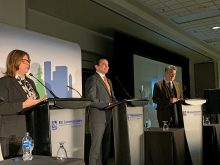If Portage la Prairie fixed all the sidewalks, roads and water mains it needs to, the city would be $11 million over budget.
Now, they’re faced with another bill coming due – the anticipated $25 million it will take over the next five years to meet new provincial regulations for nutrient removal from waste water.
Crumbling infrastructure is not just cities’ problem these days – it’s a steady decline facing virtually every small town and village in rural Manitoba stemming from years of neglect, says Portage la Prairie Mayor Earl Porter.
Read Also

Mazergroup’s Bob Mazer dies
Mazergroup’s Bob Mazer, who helped grow his family’s company into a string of farm equipment dealerships and the main dealer for New Holland machinery in Saskatchewan and Manitoba, died July 6 from cancer.
“We’ve been ignored for years and now we’ve got a problem so big we don’t have the dollars to fix it.”
Reeve of the RM of Portage la Prairie Kam Blight echoes Porter’s sentiments. Some RM residents don’t have access to clean drinking water, but the RM doesn’t have the $5 million to $7 million needed to construct the rural water plant to provide it, said Blight. It also faces major drainage and other water infrastructure work, yet has just small amounts of cash at any one time to tackle it.
Blight doesn’t like to speculate, but as he looks ahead he doesn’t see a strong future for rural Manitoba if these needs go unmet.
“We’re going to lose people,” he said.
INFRASTRUCTURE NEEDS
Blight and Porter were among dozens of municipal leaders who met in late August with representatives of the Association of Manitoba Municipalities to talk specifics on what rural Manitoba’s communities need if they are to keep roads, water systems and other fundamental infrastructure intact.
The meetings are part of the AMM’s pre-election Putting Communities First campaign to press the issue with provincial candidates seeking election this fall as well as highlight the need for new municipal revenue sources.
Municipal leaders have spent the past two weeks meeting with AMM officials as well as provincial candidates in Dauphin, Gimli, Brandon, and Lorette.
Like Portage la Prairie, Gimli foresees a $10-million bill to replace aging water lines that date to the 1950s, and owes another $8 million for a sewage treatment plant with about 20 years’ life expectancy left.
Brandon, likewise, eyes a massive bill of $165 million for all its major infrastructure repair needs, including work done to water mains that are now over a century old.
In Lorette, community leaders see a decline in school enrolments, yet cannot afford to develop serviced land for new housing.
In Dauphin, lack of high-speed Internet and cell service topped the list of infrastructure needs.
TOP PRIORITIES
Over half of all towns list streets and roads repairs and water infrastructure as top priorities. Cracked sidewalks, playgrounds in need of upgrades and decrepid halls are other concerns.
The province’s municipal infrastructure deficit has been estimated at more than $11 billion, or $10,000 for every man, woman and child living here.
At August’s end, 70 per cent of the province’s 197 municipalities had passed resolutions calling on all parties to commit, if elected, a portion of existing PST revenue to repairing and upgrading the infrastructure in Manitoba communities.
Coming up with the money is impossible for local governments, many of whom are at their borrowing limit, said AMM president Doug Dobrowolski in an interview following the Portage gathering August 25.
The next government must help local government develop alternate revenue sources, Dobrowolski said, adding that there needs to be focused attention on a host of sources. One of AMM’s “asks” is for one cent of the existing provincial sales tax to go to municipal infrastructure – which would produce $249 million annually.
The other is for a rebate on a tax one level of government now levies on the other.
REBATE
“We’ve been asking that the government rebate the PST portion that municipalites pay to the province,” said Dobrowolski. That would be another $24 million, and it’s money that local government leaders say shouldn’t be flowing out of their coffers in the first place.
“We don’t feel it’s right that one level of government is taxing another level of government,” he said.
They also call for an end to provincial downloading and new regulation that comes without dollars to comply.
“We need to be looking at a whole host of things, not just one or two,” Dobrowolski said. “Let’s streamline some processes. It could save everybody some money, the province included.”
The AMM launched its Putting Communities First campaign this spring to make sure rural communities’ needs get attention by candidates in the lead-up to the October 4 provincial election.
The campaign starts this month with media advertising in print and radio advertising.



















